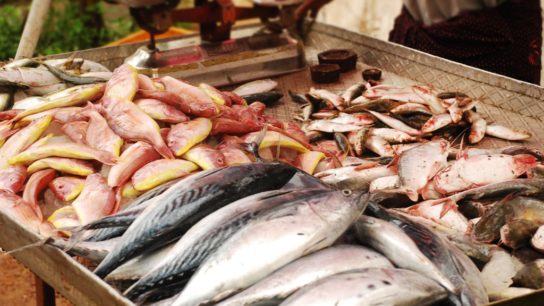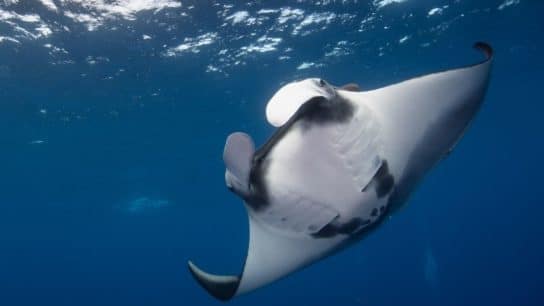Oil is an essential part of our lives, from the oil used for cooking to the black crude oil deep in the ground, which is transported and exported all across the world and used to produce fuels and plastics. However, poor management and upkeep often lead to oil spills. In this article, we look at how oil spills affect the environment and marine life and ecosystems.
—
Crude oil, the liquid remains of ancient plants and animals, is a fossil fuel that is used to make a wide range of fuels and products. Oil is found below ground or below the ocean floor in reservoirs, where oil droplets reside in “pores” or holes in the rock. After drilling down and pumping out the crude oil, companies transport it by pipes, ships, trucks, or trains to processing plants – also known as refineries. There, the oil is refined so it can be made into different petroleum products, including gasoline and other fuels, as well as products used in our daily lives such as plastics, soaps, and paints. However, when oil is released into the ocean, accidental or otherwise, it creates monumental environmental damage. Each year, 706 million gallons of waste oil enter the ocean, leading to devastating consequences.
Causes of Oil Spills
Oil spills in oceans can occur naturally, which can have huge impacts on nature itself. In fact, as much as one half of the oil that enters the coastal environment comes from natural seeps of oil and natural gas. Such oil regularly seeps from the bottom of oceans due to eroding of sedimentary rocks, and enters the marine environment. There are also other natural factors such as climatic conditions and disturbance in play, where oil seepage are often found in places where oil and gas extraction activities are also located –though studies are unable to link whether human activities have exacerbated the natural factors. Luckily, despite the heavy spilling, the soil seeps out at a very low rate, and is more natural and less toxic than processed refined oil, allowing marine life to adapt to it.
But the most damaging oil spills that occur derive from anthropogenic causes, which are leaks and spills from oil refining, handling and transport, storage and use of crude oil and any of its distilled products. Among them, most are primarily accidental spills, which can occur in various circumstances. For instance, when stored improperly without good maintenance, oil may leak from the containers. But for large and sudden spills, they are usually from accidents in offshore drillings and ruptures of big transporting vessels such as tanker ships.
There are also intentional oil discharges such as tanker ship captains cleaning their tankers and washing out the residue oil directly into the ocean. This may seem insignificant; however, due to the large number of ships and the large size of the tankers, the amount of discharged oil could build up to a substantial number.
More on the topic: Oil Pollution and Spills: Who Is Responsible?
Major Oil Spills in the Ocean
Oil spills used to occur frequently in the past, with an average of 78.8 spills per year back in the 1970s. One of the most disastrous spills back then is the Amoco Cadiz oil spill, when a very large crude carrier stocked with nearly 69 million gallons of light crude oil, ran aground on shallow rocks off the coast of Brittany, France in 1978. The impact slashed holes in the hull and container tanks, subsequently releasing the oil from the ship. About 321km of the French coast was polluted by the oil slick, which killed millions of invertebrates, such as mollusks and crustaceans, and an estimated 20,000 birds, as well as contaminated oyster beds in the region.
With better control and care, the number of oil spills have decreased greatly down to an average of 78.8 from the 1970s to 6.2 spills per year in the 2010s. However, the few spills that have occurred in recent years still have great consequences on the environment. The largest accidental oil spill in history occurred in the Gulf of Mexico on April 20, 2010, after a surge of natural gas blasted through a cement well cap that had recently been installed to seal a well drilled by the Deepwater Horizon oil platform. The accident killed 11 workers and injured 17 more. 206 million gallons of oil were released, and about 2,100 km of the US Gulf Coast from Texas to Florida was coated with oil.
You might also like: How The UN Is Rushing to Stop A Potentially Catastrophic Oil Spill In Yemen
Effects of Oil Spills on Marine Life
So how do oil spills affect the environment? Depending on where and when a spill happens, from a few up to thousands of animals and plants can be killed or injured. Such oil spills are not harmful only to marine animals like fish and seashell animals, but also to other species such as marine birds, sea turtles and other mammals. Oil destroys the insulating ability of fur-bearing mammals like sea otters, and the water-repelling abilities of a bird’s feathers, exposing them to the harsh elements. Many birds and animals also swallow oil and are poisoned when trying to clean themselves or eating oiled prey.
Fish and shellfish can also digest oil, which could cause changes in reproduction, growth rates or even death. Important species such as oysters, shrimp, mahi-mahi, grouper, swordfish and tuna also could suffer population declines or become too contaminated to be safely caught and eaten by their predators, including humans.
More on how oil spills affect the environment: Oil Spill Affecting Dolphins 10 Years Later
Fortunately, the oil spills do not stay in the affected area forever. Nature itself can help tackle the issue; wind and waves will naturally disperse the oil over time, and parts of the oil pool will eventually evaporate. Naturally-occurring microbes will also do their work to start breaking down the oil. But this is a slow and unreliable process that needs to be closely monitored.
There is not much that we can do when it comes to oil spills, especially in the initial stages. Experts and professionals do their best to scoop and soak up, as well as burn off the oils off the surface of the ocean. Others can volunteer to help clean the beaches. However, these are all just damage control.
There were a total of six major oil spills in 2021, and 2022 has already seen thousands of barrels of crude oil spilled from a refinery off the Peruvian coast about 30km north of Lima – as a result of violent eruption of a volcano near Tonga. While accidents, man made or by nature, can occur, oil transportation will always come with a risk. The devastating impacts of the environment and marine life therefore further bolster the case against our dependence on oil.
Featured image by: Wikimedia Commons
This article was originally published on March 14, 2022
How can I contribute to a more sustainable planet?
- 🗳️ Vote for Climate Action: Exercise your democratic rights by supporting candidates and policies that prioritize climate change mitigation and environmental protection. Stay informed with Earth.Org’s election coverage.
- 👣 Reduce Your Carbon Footprint: Make conscious choices to reduce your carbon footprint. Opt for renewable energy sources, conserve energy at home, use public transportation or carpool, and embrace sustainable practices like recycling and composting.
- 💰 Support Environmental Organizations: Join forces with organizations like Earth.Org and its NGO partners, dedicated to educating the public on environmental issues and solutions, supporting conservation efforts, holding those responsible accountable, and advocating for effective environmental solutions. Your support can amplify their efforts and drive positive change.
- 🌱 Embrace Sustainable Habits: Make sustainable choices in your everyday life. Reduce single-use plastics, choose eco-friendly products, prioritize a plant-based diet and reduce meat consumption, and opt for sustainable fashion and transportation. Small changes can have a big impact.
- 💬 Be Vocal, Engage and Educate Others: Spread awareness about the climate crisis and the importance of environmental stewardship. Engage in conversations, share information, and inspire others to take action. Together, we can create a global movement for a sustainable future.
- 🪧 Stand with Climate Activists: Show your support for activists on the frontlines of climate action. Attend peaceful protests, rallies, and marches, or join online campaigns to raise awareness and demand policy changes. By amplifying their voices, you contribute to building a stronger movement for climate justice and a sustainable future.
For more actionable steps, visit our ‘What Can I do?‘ page.
This story is funded by readers like you
Our non-profit newsroom provides climate coverage free of charge and advertising. Your one-off or monthly donations play a crucial role in supporting our operations, expanding our reach, and maintaining our editorial independence.
About EO | Mission Statement | Impact & Reach | Write for us













